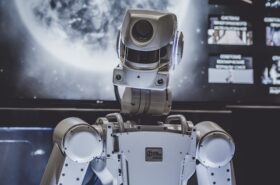
Almost every mainstream industry has benefited from advancements in artificial intelligence (AI) and automation. By the end of 2021, the AI market size had surpassed the $328 Billion mark, which is a clear indicator that many companies in various industries have invested in AI-powered tools.
In today’s article, we will discuss some of the industries that have been the major beneficiaries of AI in the last couple of years. We shall also explain how each of these industries has benefited from the advancements in AI and automation. Without wasting any more of your time, let’s get started!
The Major Industry Beneficiaries of AI
Automotive industry benefitting from AI

One of the major beneficiaries of AI is the automotive industry. Every major company in this industry is using AI to add self-driving capabilities to their cars. Cars are now turning into rolling computers as the focus on software and automation is becoming a major priority and not a by the ways like it used to be a couple of decades ago.
New players like Tesla, Rivian, and Lucid are using software optimization and artificial intelligence to disrupt companies that have been in this business for over 100 years. The race to having the first fully-autonomous car is still on, which will largely depend on who has the best AI systems integrated into their cars.

Of course, hardware components like cameras and lidar sensors, along with the computing power of these cars, will also play a major role in creating a fully autonomous vehicle. The data that these companies have about the roads and the overall driving experience of their users will also play a major role in creating reliable and safe self-driving systems.
But remember, for this data to be useful, it has to be utilized by AI systems in the car’s computer. Tesla is still ahead of the competition in self-driving, mainly because they have collected more data. Their self-driving system can make better decisions because it has more data to look at.
Healthcare benefitting from AI

There are a lot of practical use cases of AI in the healthcare industry, which has made the life of healthcare workers much easier. One of the game-changing use cases of AI in this industry has been robot-assisted surgery. Doing robot-assisted surgery allows doctors to perform complex surgeries with more precision, flexibility, and control than using conventional techniques to do surgeries.
The robot-assisted surgery system consists of the camera arm and a robot arm that are all connected to a computer that the doctor uses to control the movement of the robot arm that is attached to a surgical blade. The combination of Artificial intelligence and the doctor’s knowledge has improved the success rate of some complex surgeries that would sometimes lead to the loss of lives.
Another practical use case of AI in this industry is disease diagnosis and recommending the best medication to patients. There are medical AI systems that can determine the disease someone is suffering from when they are provided with test results and enough information about the patient. They can also recommend the most appropriate medication the patient should take to recover faster. Of course, these systems provide more accurate results the more the data they are fed with. So, they continue to get better over time.
eCommerce benefitting from AI

By the end of 2021, the number of digital shoppers across the globe was about 2.14 billion. Over 230 of these online shoppers are Americans. The advancements in artificial intelligence and computing power have made it much easier for eCommerce platforms such as Amazon, eBay, and BestBuy to deal with millions of users every day.
If your eCommerce website is to serve millions of people every day, there is a need to have an effective search engine and ranking algorithms that will help these people to find the items they need. For example, Amazon has over 350 million on its platform. Raking these products whenever a user inputs a certain query requires sophisticated ranking algorithms and massive computing power.
Amazon and most of its competitors also have a home page that will show you unique products based on the data they have about you. You will notice that when you search for a product such as a MacBook Pro on Amazon or eBay, your homepage will start showing Mac accessories and other related products the next time you sign in to your account.
These suggestions are all possible thanks to the AI models that are fed with data about the different users. Giving users the most accurate suggestions is one of Amazon’s superpowers in the eCommerce business. Amazon also has huge amounts of data about its users, which is why its ranking and product suggestion algorithms are better than its competitors.
So, any company that wants to break through in the eCommerce space needs to invest in artificial intelligence heavily.
4. Digital Marketing benefitting from AI

Almost every business in this era should be using digital marketing as a way to reach its target customers. People now spend hours browsing the internet, so the best way to communicate with them is through digital marketing platforms. You will need to use reliable digital marketing tools such are marketing and sales automation software if you want to effectively communicate to your target customers.
Most modern sales and marketing automation tools have AI capabilities that have made it possible for marketers to target the right audience using the most effective message and at the right time. Modern digital marketing platforms built by the likes of Salesforce and HubSpot have sophisticated AI algorithms that are being fed with massive amounts of data about customers to enable them to make more accurate decisions.
Marketing and sales automation tools have features such as lead scoring and email personalization that wouldn’t have been possible without AI. These are useful features that make life easier for marketers and salespeople that don’t want to waste time on prospects that will likely not buy their products.
Marketing automation also allows marketers to focus on tasks that require critical thinking and human judgment. The repetitive and tedious tasks such as responding to first-time customers that are asking about the prices of the products on sale are now being done by chatbots.
5. Manufacturing benefitting from AI

Another primary industry that has significantly benefited from AI is manufacturing. There is a lot of artificial intelligence that is currently integrated into manufacturing equipment and systems. For example, most of the equipment used in modern factories is automated and can do most of the work that was initially done by humans.
Using AI-powered equipment and robots has significantly improved the productivity of these plants. These robots also leverage the power of machine learning, so they are always gathering more data which in the end enhances the quality of decisions they make. Another common use case of AI is in maintenance.
Maintenance systems now use AI to determine the equipment that needs to be maintained and when. These systems are fed with real-time data about how each piece of equipment is used and its performance over time. They then use this data to choose the appropriate time when each machine should be maintained instead of using a rigid planned maintenance system.
These AI-powered maintenance systems can also predict the potential failure of any machine in the factory. This enables the maintenance team to handle such cases ahead of time before the actual failure happens.
6. Logistics benefitting from AI

This industry involves planning and executing the efficient transportation and storage of goods from the point of origin to the point of consumption. Most of the major logistics companies have to deal with hundreds of thousands or even millions of goods every day. Coping with this volume of goods wouldn’t be possible without AI and automation.
One of the common use cases of AI in the logistics industry is in the tracking of the level of stock in the inventory to ensure it meets the potential demand. The systems used in inventory management use available data and machine learning to predict the potential demand for goods in the foreseeable future.
This prediction is then used to determine how much more goods should be stocked to meet this demand. Over time these predictions get more accurate as the machine learning models get more data about demand and supply. This reduces losses that could result from having a lot of inventory that has been inactive for several years.
The movement of goods within the inventory stores is also done by AI-powered robots, which boosts productivity. These robots are also able to move goods from one position to another based on demand. They also have the ability to load the products on trucks that are supposed to deliver the products to their respective destination.
7. Insurance benefitting from AI

The insurance industry is also heavily relying on AI to improve the efficiency, accuracy, and effectiveness of certain operations. One of the common use cases of AI in this industry is in claim fraud detection. There are AI-powered systems that can analyze vast amounts of data about any given claim to detect any unusual patterns.
This reduces the chances of compensating clients with claims that don’t meet the terms signed when subscribing to the insurance policy. Another use case of AI in insurance is in pricing and underwriting. The price of any insurance policy is determined after assessing the risk of the events the client wants to insure themselves against.
Initially, pricing was done manually, which required a lot of time for evaluators to determine the risk of the events before they could come up with the appropriate price for the policy. Besides wasting time, humans would also make errors that could sometimes lead to losses to the insurance company.
8. Banking and Finance benefitting from AI

Banks and several other financial institutions now rely on AI in most of their operations. One of the common use cases of AI is in determining the optimum interest rate for lending to different clients. The interest rate for lending usually varies based on the market conditions and, of course, the client’s credit score.
Determining this rate requires analyzing huge amounts of data which would take a lot of time if done manually. Banking systems now use machine learning and powerful computers to analyze this data in real-time. Another common use case of AI in this industry is in forex trading. Many banks and other financial institutions earn from forex trading.
Over 90% of forex trading today is done by robots. In forex trading, AI-powered systems are used to analyze massive amounts of data to predict the most likely event in the foreseeable future. So, banks with the smartest AI systems will usually benefit more since their systems can make more accurate decisions about the future demand of any given currency.
9. Travel and Hospitality benefitting from AI

AI is also playing a crucial role in the travel and hospitality industry. One of the major use cases of AI in this industry is the personalization of services for different people. Systems powered by AI and ML enable the Travel and Hospitality industry to personalize services by looking at the data of different individuals and suggesting the most ideal services for them.

Hotel receptions also use AI-powered systems for auto-check-ins and making phone calls to residents to provide them with useful information that they may need. AI assistants and Intelligent chatbots are also used to book flights, accommodation, and hire vehicles online for travelers. Such tasks were initially done by travel agents.
Final thoughts

Almost every industry today is benefiting from the power of AI and automation. One of the main reasons for using AI in various industries is its ability to analyze vast amounts of data faster and make accurate decisions about any given event. These kinds of tasks would usually take a lot of time when done manually by humans. AI-powered tools are also accurate, and their decisions improve over time as they are fed with more data.



